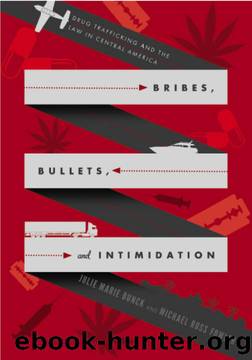Bribes, Bullets, and Intimidation by Bunck Julie Marie Fowler Michael Ross

Author:Bunck, Julie Marie,Fowler, Michael Ross.
Language: eng
Format: epub
Publisher: Pennsylvania State University Press
Published: 2012-11-15T00:00:00+00:00
Conclusion
As the drug trade climbed to new heights in Guatemala, it was sometimes said that the country had entered a process of âcolombianization.â343 Plainly, Guatemala and Colombia experienced the common symptoms of growing narco-corruption and drug-related violence, and certain parallel factors help explain why the drug trade has flourished in both. Guatemalan and Colombian governments have both confronted long-standing regional divisions, and for long periods neither has been able to exercise extended control over great swathes of their countryside.344 Traffickers have capitalized on lengthy internal conflicts, especially when the fighting has been largely confined to particular regions, since these clashes have diverted resources and attention and threatened state authority.345 This was also true of the civil wars in both.
Government institutions in Guatemala and Colombia have also taken on, and then often fumbled, a large array of tasks. Thick webs of laws and regulations have been created, only to be disregarded in practice. Inefficient bureaucracies have been unaccountable and unresponsive to the public.346 Extraordinarily rapid turnover in personnel has marked governance.347 Such matters have weakened state authority, jeopardized political legitimacy, and widened opportunities for transnational criminals to operate successfully. More subtly, in describing modern Colombia, one scholar termed âthe traditional use of violent means to accomplish personal and political endsâ a national characteristic âembedded in . . . society and political culture,â posing âsome of the most difficult challenges to the countryâs democratic institutions.â348 Such a statement applies equally to Guatemala, where feuding in an effort to settle scores, inside and outside the drug trade, has become a bloody national pastime.349
As compared to the other Central American states, Guatemala has had to contend with a host of bridge-favoring factorsâsome familiar, others rather different than those found in its neighbors. As traffickers looked to open Central American routes, Guatemala was particularly vulnerable: a badly fractured society, suffering through the throes of civil war and, later, its aftermath. If the regionâs most peaceful and solidly democratic states have failed to curb drug transshipment, traffickers might be expected to take even greater advantage of its most deeply split country. In fact, Guatemala has been besieged by violence and grave social problems. Its government has been hampered by demoralized and underpaid bureaucracies, overseen by beleaguered and sometimes corrupt politicians, and the country has labored under an extraordinarily weak criminal-justice system with laws poorly tailored to combat organized crime. Not only has Guatemalan geography, particularly its position neighboring Mexico, been of paramount importance, but Guatemalan cartelitos have come to serve as crucial links between Colombian and Mexican drug enterprises.350
The countryâs most stable and well-endowed institution has been its armed forces, which have, in fact, offered notable assistance in certain antidrug efforts. Traffickers, however, have found the militaryâs privileged position and extensive influence over Guatemalan society to be extremely useful. Particular officers have been corrupted to selectively enforce antidrug laws and skim money and drugs from law-enforcement operations. Some have gone to work for, or even led, prominent drug rings, with handsome compensation paid for their knowledge, expertise, and contacts.
Download
This site does not store any files on its server. We only index and link to content provided by other sites. Please contact the content providers to delete copyright contents if any and email us, we'll remove relevant links or contents immediately.
Zero to IPO: Over $1 Trillion of Actionable Advice from the World's Most Successful Entrepreneurs by Frederic Kerrest(4510)
Machine Learning at Scale with H2O by Gregory Keys | David Whiting(4292)
Never by Ken Follett(3937)
Harry Potter and the Goblet Of Fire by J.K. Rowling(3848)
Ogilvy on Advertising by David Ogilvy(3604)
Shadow of Night by Deborah Harkness(3357)
The Man Who Died Twice by Richard Osman(3072)
Book of Life by Deborah Harkness(2930)
The Tipping Point by Malcolm Gladwell(2911)
Will by Will Smith(2908)
0041152001443424520 .pdf by Unknown(2843)
My Brilliant Friend by Elena Ferrante(2824)
Purple Hibiscus by Chimamanda Ngozi Adichie(2822)
How Proust Can Change Your Life by Alain De Botton(2805)
How to Pay Zero Taxes, 2018 by Jeff A. Schnepper(2646)
Hooked: A Dark, Contemporary Romance (Never After Series) by Emily McIntire(2547)
Rationality by Steven Pinker(2352)
Can't Hurt Me: Master Your Mind and Defy the Odds - Clean Edition by David Goggins(2323)
Borders by unknow(2301)
